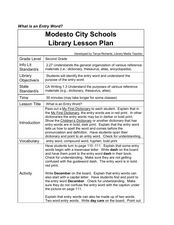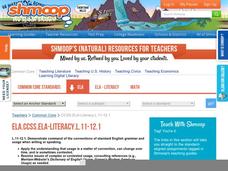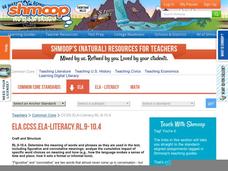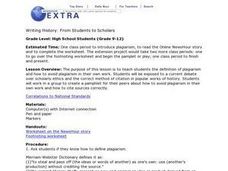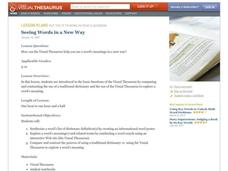Curated OER
Dictionary Work - Entry Words
Second graders examine the use of entry words in the dictionary. In this dictionary use lesson, learners look at guide words in a children's dictionary as the teacher/librarian describes the characteristics of each entry. They complete...
Florida Center for Reading Research
Vocabulary: Word Meaning, Dictionary Digs
Young scholars dig through dictionaries to uncover the wealth of information they provide. Using the included graphic organizer, children learn about target words by finding their parts of speech, pronunciation, definition, synonyms, and...
Florida Center for Reading Research
Vocabulary: Word Meaning, Dictionary Cube
Scholars work together to define words and answer questions using a dictionary cube.
Shmoop
ELA.CCSS.ELA-Literacy.RL.11-12.5
What would happen if I structured this review by beginning in the middle of it? Or by flashing back to the dinner I had last night that gave me bad heartburn, and then transitioned into how the lingering burn of acid seeped into my...
Shmoop
ELA.CCSS.ELA-Literacy.L.11-12.1
Despite English grammar rules, in the e-world the plural of mouse is mouses. lol. Standard American English is constantly evolving. Introduce your class members to a variety of terms that describe different usage changes (economy,...
Southern Poverty Law Center
Analyzing How Words Communicate Bias
Words are powerful ... can your class choose them wisely? Scholars evaluate news articles to discover the concepts of tone, charge, and bias during a media literacy lesson. The resource focuses on recognizing implicit information and...
Shmoop
ELA.CCSS.ELA-Literacy.RL.9-10.4
The fourth standard for reading literature in the Common Core calls for young readers to be able to determine the figurative and connotative meanings of words and phrases. Use this resource, a continuation of a series of Common Core...
Curated OER
Reading Study Guide: I Know Why the Caged Bird Sings
Meant for use with Maya Angelou's first autobiographical volume I Know Why the Caged Bird Sings, the materials here are designed for a homeschool setting, but they'd suit any classroom or text. Graphic organizers, chapter summary...
Curated OER
Writing History: From Students to Scholars
An Online NewsHour article about scholarly ethics launches this study of plagiarism. Since historians are supposed to bring original ideas and perspectives to their publications, they must give credit to the ideas of others. After a...
Southern Poverty Law Center
Evaluating Online Sources
All sources are pretty much the same, right? If this is how your class views the sources they use for writing or research projects, present them with a media literacy lesson on smart source evaluation. Groups examine several articles,...
Curated OER
Create a Word
Brainstorm new words for a class dictionary. In small groups, young learners read and discuss an article about how words get into dictionaries. They then develop a new word, use it in a sentence, and share their creations with their...
Curated OER
Seeing Words in a New Way
What's the best resource to use when looking up words? Use Visual Thesaurus to see a word's meaning. The class accesses the interactive website and then compares and contrasts the difference between using a traditional dictionary and the...
Florida Center for Reading Research
Vocabulary: Word Meaning, Undercover Meanings
Support young scholars with studying new vocabulary using this foldable resource. By cutting and folding the included template, learners can record definitions, examples, and a sentence for four different words.
Curated OER
Picture Dictionary
Young scholars write and contribute one page for a class picture dictionary. They discuss how to alphabetize words, and examine both regular and picture dictionaries and how they are organized. Next they create a page for the class...
Curated OER
If a Runner Runs, Does a Sweater Sweat?
Play with words and word meanings involving the suffix -er. After reading a sample list of words, young readers look up each one in the dictionary to decide which words refer to people, animals, or objects, or have three or more...
Curated OER
Guided Reading Organizer for Chain Reaction
The class uses Chain Reaction, a magazine, to build a better understanding of Latin and Greek roots found in scientific vocabulary. They use two attached worksheets to help them read a scientific article, using visual clues and their...
Curated OER
100 Questions
Gather around to play a game! Middle and high schoolers answer questions (provided here) using various reference materials. Bring encyclopedias and other reference materials to class, as each group has limited Internet access! An answer...
Florida Center for Reading Research
Vocabulary: Morphemic Elements, Getting to the Root of It
Young readers learn how to get at the root of new vocabulary with this fun language arts activity. When working in pairs, children begin by matching unknown vocabulary words to their Greek or Latin roots. When all the vocabulary cards...
Florida Center for Reading Research
Vocabulary: Word Meaning, All For One
Given a deck of cards with different words printed, pairs draw cards and work together to locate definitions for each multiple-meaning word. Learners complete a worksheet that challenges them to write the word, two of its definitions,...
Curated OER
The Tell-Tale Hearts of Writers
Knock, knock, knock...Creep out your class with a critical thinking lesson focused on word relationships in Edgar Allen Poe's "The Tell-Tale Heart." They investigate the relationship between word choice, mood, and interpretation of...
Curated OER
Can Scientists Discover a Limit to Discovery?
Is there anything left to discover? Evaluate opposing sides of the debate regarding whether or not there is a future for scientific discovery. Middle and high schoolers assess quotations from the articles included to evaluate claims and...
Curated OER
How Cell Phones Work
Fifth graders are introduced to the text, LITERACY LINE viewing the contents page. They review the definition of explanatory writing; discussing the features used and complete a KWL chart to identify what they already know about how a...
Curated OER
Food Dictionary - Harvest Festival
Students explore healthy foods and dictionary organization. Students create a list of healthy foods. They construct their own food dictionary, with illustrations. Students model how a dictionary page should be filled with a picture,...
Council for Economic Education
China - Where Will They Fit in the World Economy?
Teach scholars why China is so crucial to global economics through an informative resource. Activities include using databases to search for information, watching a video or listening to a podcast, and reading about China's economy as a...


